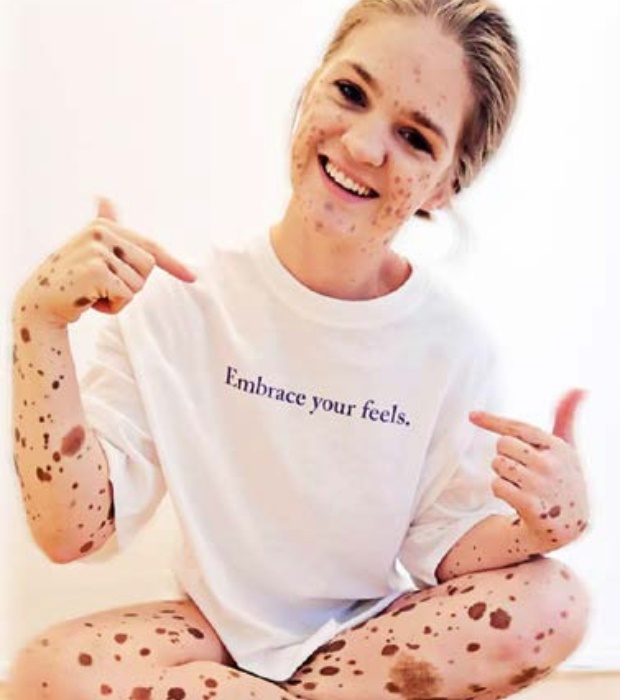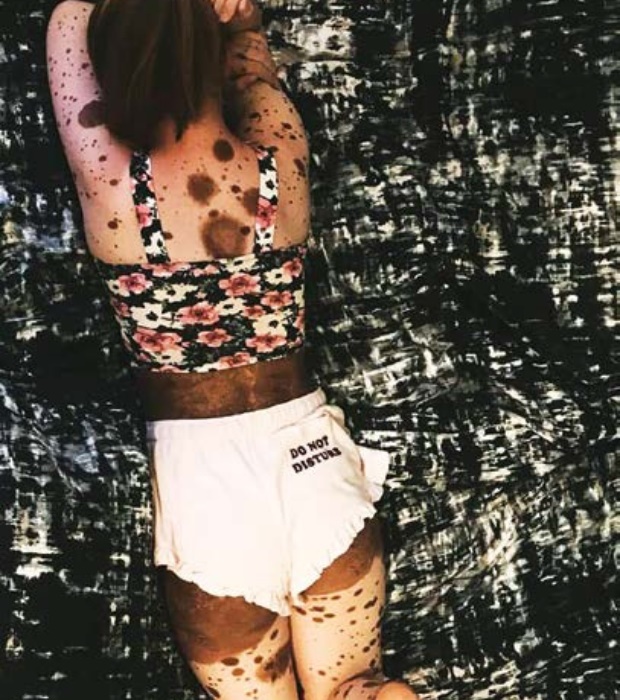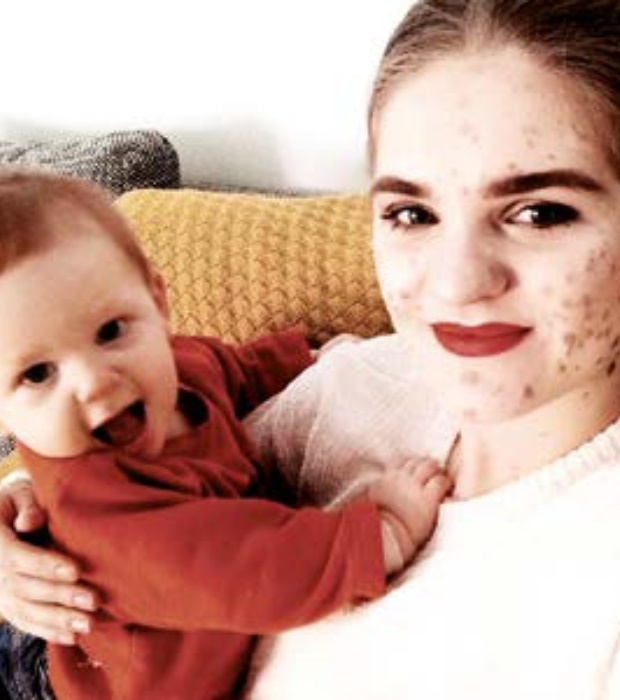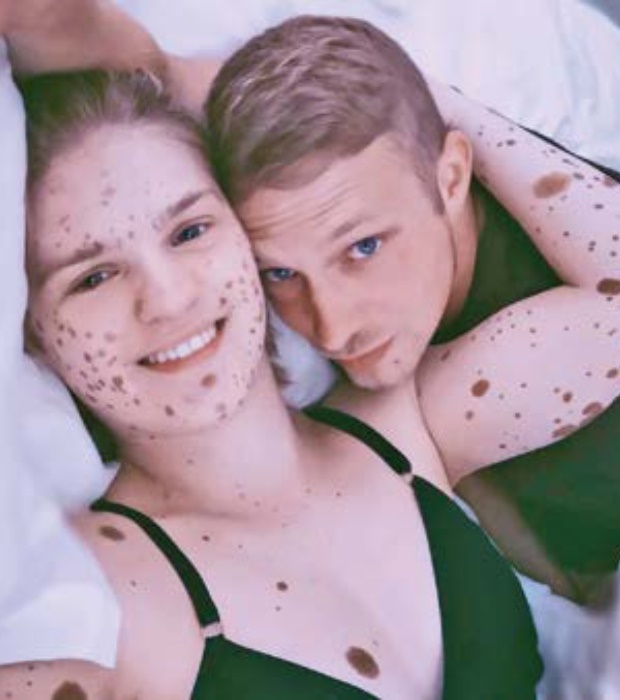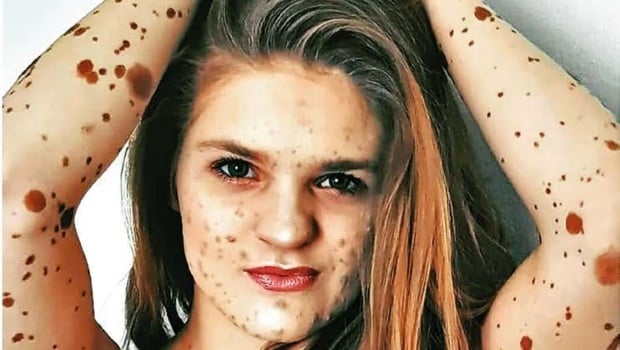
She’s still haunted by her classmates’ cruel taunts. They called her ugly and told her she looked like she’d been splattered with mud. One of her nicknames was Dalmatian – all because of the dark spots that covered her skin.
Marika Nagy was born with congenital melanocytic nevus (CMN), a rare genetic condition that resulted in about 60% of her skin being covered in birthmarks.
Her childhood in Bremen, Germany, was hellish. By the time she was a teenager the years of bullying had left her with such deep emotional scars she needed six years of therapy to help her cope.
But now the 22-year-old is having the last laugh by using the once-embarrassing skin condition as the foundation of a successful modelling career.
The ginger-haired beauty recently landed a contract and has already done shoots for a number of clients, including German underwear brand Tizz & Tonic.
Yet she insists she isn’t doing this for money or fame – rather, it’s about getting the chance to be a role model to girls who feel insecure about their flaws.
“When I was young, I had no one to look up to,” she says. “I didn’t feel represented. Fashion pages were filled with perfect people.”
She’s aiming to show the world there’s beauty in imperfection. Instead of being ashamed of being different, she’s treating her spots as a badge of honour, even going so far as to change her name to Mary Nevus to show how wholeheartedly she’s embraced her condition.
“My birthmarks make me special,” she says. “The world would be a very boring place if we all looked the same.”
Axel Nagy admits the first time he saw his daughter he was shocked. CMN is usually the result of faulty pigment cell development in the embryo and affects about one in 500 000 babies.
Ultrasounds before Mary’s birth gave no indication of the condition so he and his wife were stunned.
“A doctor came and said, ‘Something is different with your daughter.’ And he showed me Marika covered with a towel. He opened it up and then I saw all of her spots.”
At first the marks were only on the upper part of her body but eventually they spread all over, even to her scalp, Mary explains as she chats to us via Skype from her home in Germany.
Although the spots are benign, sufferers with large or multiple birthmarks have a higher chance of developing melanoma, the most serious type of skin cancer. It’s for this reason that Mary underwent seven skin operations in infancy, her first occurring when she was just a few weeks old.
“Doctors told my parents that because I was younger, I had a better chance of avoiding scarring,” she says.
“So they removed the marks on my back. Those were considered risky for my health because they were quite big, darker than the others and weren’t flexible. My parents were quite scared but agreed to do it anyway.”
They had good reason to be nervous – doctors warned that Mary had a 50% chance of not surviving the complex surgeries.
Mary’s last surgery was at 11 months old and she’s grateful she hasn’t had to go under the knife since. She has annual checkups to monitor her spots and manages the condition by wearing a special sunscreen and limiting the amount of time she spends in the sun.
But the physical side of CMN is much easier to deal with than the emotional aspect. Mary tells us that when she was old enough to understand her condition and realised she looked different to her peers, she desperately tried to hide her body.
“Throughout my childhood I tried covering up the spots,” she says. “But the funny thing is, I didn’t feel confident with makeup because it wasn’t the right shade and I looked horrible.”
Her self-esteem issues weren’t made easier by the victimisation she endured daily. Her classmates told her she looked like a Dalmatian and made her feel “ugly, dirty, not worthy”, she says. “My parents told me I was beautiful, but it was hard to believe them when strangers pointed and laughed, or people at school told me I was ugly.”
Mary says some girls would even corner her in the school corridors to physically assault her or they’d create fake profiles on social media to leave insulting comments on her photos.
“Growing up with my condition was very hard,” she says. “I had to try to deal with the bullying and the resulting depression. I didn’t have many friends. I think the biggest issue was feeling alone.”
After finishing school she decided to take acting lessons and this did wonders for her confidence – so much so that she decided to start an Instagram account where she shared pictures of herself with a small group of followers.
And it wasn’t long before she caught the eye of social media agency Himmelrenner GbR, which wasted no time offering her a contract. She agreed and soon brands were sitting up and taking note.
Yet it wasn’t her modelling success that finally helped her accept her condition. For Mary, that defining moment came in 2018 after the birth of her son, Milan.
“I never really wanted to be a mom,” she says. “But Milan came as a beautiful surprise.”
Although CMN isn’t hereditary she felt anxious throughout her pregnancy.
“Doctors told me I couldn’t pass on my condition to my child, but to be honest, I didn’t believe anything until I saw him,” she says. “On the day he was born, the first thing I did was check him all over and when I saw he was fine, I took a deep breath and said, ‘Okay’.”
Mary says Milan, who turns two in January, is a “fun, energetic, silly and positive little guy” who’s taught her what’s important in life.
“You realise as a parent that you want your child to be happy – that’s more important than visual appearance.”
She and Milan’s dad are no longer together, but Mary says she’s been in a happy relationship for the past nine months with a guy she met through friends.
And as she continues with modelling she hopes to send out a positive message about body image.
“I think beauty means diversity and beauty doesn’t come in one size, one colour, one shape,” she says.
People still stare at her in the street but now it doesn’t bother her in the slightest.
“Young kids are particularly curious, so they’ll tug their parents’ sleeves and say “Mommy, look at that girl,” she says. “It doesn’t offend me, though. I do look different, and I’m proud of that.”
Extra source: BarcroftTV




 Publications
Publications
 Partners
Partners




